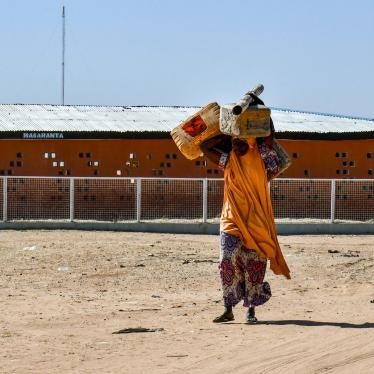Although the government of Burundi has promised Nelson Mandela that it will close its squalid "regroupment" camps, that promise has not yet been fulfilled, Human Rights Watch charged in a report Emptying the Hills
Regroupment in Burundi.
The former South African president is leading a new round of the Burundi peace talks, opening tomorrow. Burundian rebel groups, who are of critical importance to any efforts to end the six-year civil war, have said they will attend the talks only if the regroupment camps are closed.
The 35-page report, "Emptying the Hills," says that the Burundian government forced as many as 350,000 civilians into the camps. Although Burundi president Pierre Buyoya promised Mandela to close the camps by July 31, some tens of thousands of people are still living in them.
The report also details abuses of the National Liberation Forces (Forces Nationales pour la Lib?ation, FNL), a rebel group fighting the Burundian government.
Beginning in September 1999, Burundian soldiers forced civilians to leave their homes and to build temporary shelters of sticks, banana leaves, and plastic sheeting at designated sites, which often lacked water and sanitary facilities. Entire families have lived for months in the cramped one-room structures. Prohibited from going regularly to cultivate the fields upon which they depend for their livelihood, camp residents were forced to depend on international food donations which were often insufficient.
"Burundian authorities said they put people in the camps to protect them," said Peter Takirambudde, executive director of the Africa division of Human Rights Watch. "But people are more likely to die in the camps, from hunger and disease, than they are in their own villages."
Being sequestered in the camps did not protect civilians from the civil war, which was the government's stated purpose. The Human Rights Watch report said that when soldiers and rebels have fought in and around the camps, residents could not flee the fighting and some were shot and killed..Soldiers have tortured and killed suspected rebels found in the camps and have raped women residents, according to the report. They have looted the homes that camp residents were forced to abandon, even removing the metal roofs for resale in the capital, Bujumbura. They have also regularly required camp residents to haul water and wood for them and have used children as spies, porters, and helpers in pillaging operations.
The report also condemns violations of international humanitarian law by the FNL. "The rebels have used the civilian camps as bases for attacking nearby military posts," said Takirambudde. "This exposes civilians to risk of injury and death and violates the rules of war." According to the report, the FNL have ambushed and killed civilians traveling in vehicles on roads near the capital and have killed others who refused to support their cause.
They have also abducted and raped women and have recruited children to serve in their forces, all violations of international humanitarian law. "If the FNL is going to be a real partner in the negotiations, it must make its combatants obey international humanitarian law," said Takirambudde.
Human Rights Watch called on international actors with influence in Burundi to step up pressure on the Burundian government to close all the camps before the July 31 deadline and to not resume forcibly displacing civilians, even if rebel activity increases during a period of heightened tensions surrounding the negotiations. It urged the international community also to use contacts with the FNL to insist that its combatants halt attacks on civilians and other violations of international humanitarian law.








